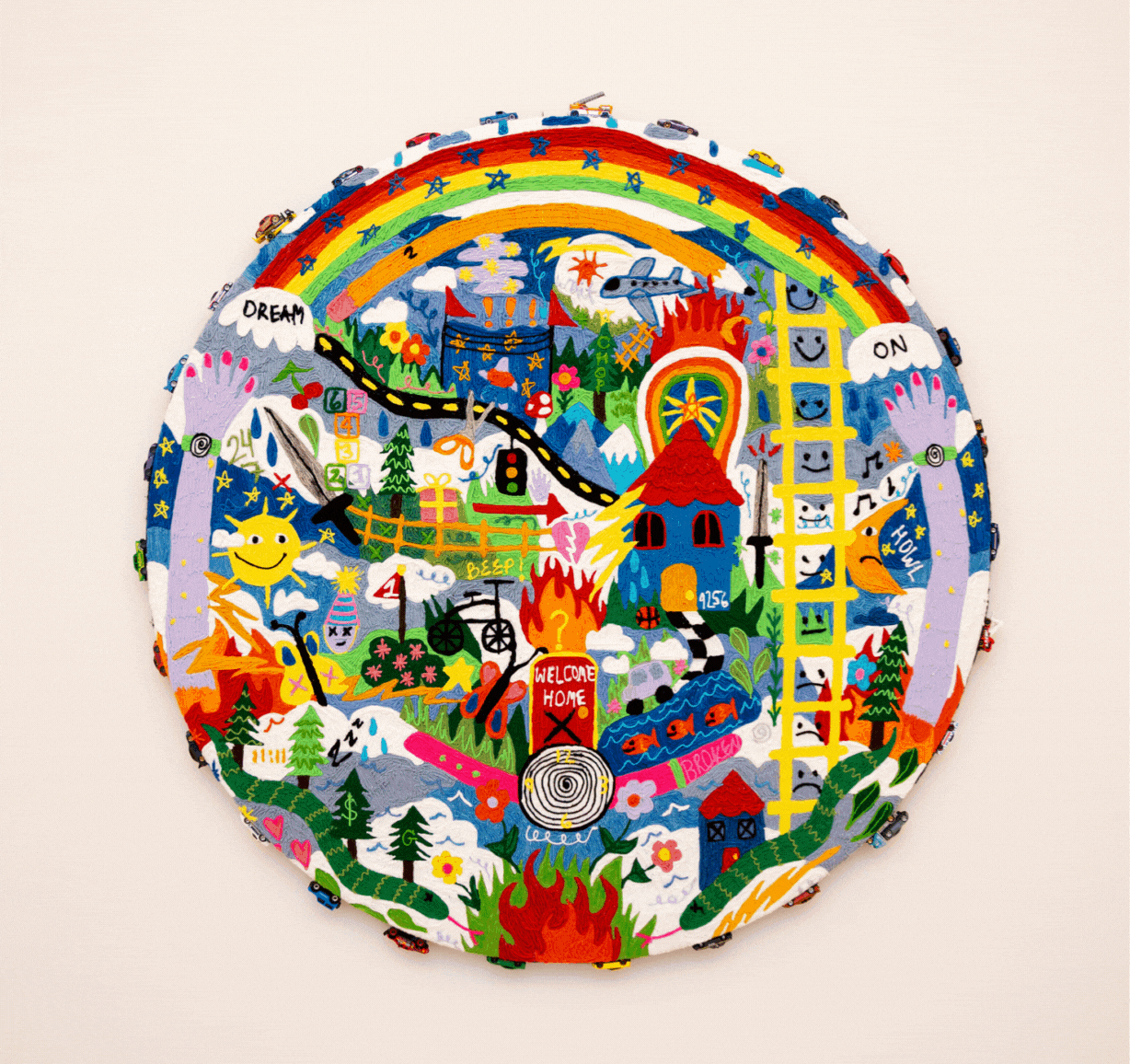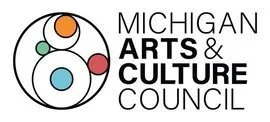The Whole Field • Volume 3 • No. 3 • New Moon • February 9, 2024
Same Road, Different Day • Kaylie Kaitschuck • Yarn Embroidery on Stretched Felt, Hotwheels • 60” in Diameter • 2021
Embeddedness, Part One—A Primer.
Staying in Place, "Relationships Good Enough to Trust," and Ecological Pain.
We’ve got friends — good people — moving away from this town of roughly 1,000. We’ve only been here three years or so — ourselves leavers of another place — and it’s not the first or second time this has happened. You know someone, and you envision a future with them in it — here, where here is bettered by them — and it doesn’t work out that way. To be clear, I don’t blame them. We’ve been there. But I do lament the loose ties we have to places. I yearn for the stability that the word “embeddedness,” at least to me, has come to represent. I sense some potency in the term.
Forgive me for ignoring the causes behind the absence of embeddedness — all of the standard push and pull factors, chasing education and jobs, the commodification and homogenization of places, housing pressures, the desire for instant gratification, “grass is greener” thinking, and so on. All of these matter, yes, but I want to focus on “embeddedness” the term, itself.
The first thing that comes to mind is staying put — staying in a place for a significant time. When zones of conflict are active, embedded journalists stay. An embedded metal shard, a glint in your heel, has staying power. And to be embedded in a community or a place generally means to have lived there for some time. An evacuating Black Hawk’s thunder shakes while the tip of the tweezers scrape and search, both saying: removal isn’t easy.
In this case, the difficulty of removal is good. I’ll sing praise of generations in place and cultures that foster good living and learning without having to leave. The organization I work for has a guiding ethos of envisioning communities “where the economy and culture are rooted in restoration of earth and its people.” Those efforts spring from time and geographic focus.
————————————————————————————————————————————————————-
My friend David Blower picked up on the ancient Greek word “pistis,” a fairly common term found in Greek mythology and the New Testament. If you’ve spent a little time studying the Bible, it’s easy, generally translated as “faith.” If you’ve spent more than a bit of time studying the Bible, it’s more difficult to pin down.
David thinks translating “pistis” as “faith” doesn’t do it justice. It’s not necessarily wrong, but it carries an anachronistic bent — it’s a word simplified and diminished. It’s no longer understood to have much relevance to the “social and political dimension,” which it should. And “allegiance,” another proposal for “pistis,” leans “militant and coercive in a way that undermines the meaning of relational trust.” David takes a different approach (detailed here.)
He works with that word, so often translated as “faith,” as a term meaning “relationships good enough to trust.” These relationships are integral to economy and culture “rooted in restoration of earth and its people.” Until we’ve uncovered networks of dependable care, reciprocity, and honesty, we have no choice except to depend on laws, rulers, hierarchies, systems, and institutions as relational guardrails. These forms of “power-over” are less beholden to the long-term care and awareness, forgiveness, and mutual aid that natural restoration grows from…
The Warp — Ideas and Inspiration
|| 1 || If you’re gearing up for the upcoming herb guild event (see the Weft below) and want to prep ahead of time, here’s timely inspiration and a recipe using rose hips from Tashia Hart. In the brief write-up, Tashia (Red Lake Anishinaabe, Duluth, MN) shares sensory memories and experiences related to Oginiig (rose hips) and other plants, which she delves further into with this podcast: Art, Nature and the Path to Growing Joy.
If you aren’t going to listen to it, I’ll share a quick note. When Hart was working on her book Gidjie and the Wolves, potential publishers kept telling her that audiences wouldn’t be able to identify with Gidjie, the book’s main character. Tashia disagreed and started Not Too Far Removed Press so that she could write as she wanted. Three out of four of her books now have been self-published. I’ve heard writers being advised to market their work through BookTok (on TikTok) and focus on content creation for mass appeal several times in the last few days, which is an approach I understand, but don’t really love. Tashia’s example of sticking to what she wanted to write on her own terms, while poking at the idea that her work is irrelevant, struck me as refreshing.
|| 2 || It feels more natural for me to approach the vision of “economy and culture rooted in restoration of the earth and its people” as an individual, but others are drawn towards more communal and policy-based solutions. Elias Crim writes on just that in Loneliness Busting (Part II). He supports “the creation of a new category of place-based small enterprises called “social co-ops,” borrowing from their documented history of success in places like Quebec, South Korea, and Emilia Romagna (Italy).” Beyond that, he outlines recommendations that specific policies intended to support co-ops of this sort should heed, draws distinctions between these “small-scale, localized…systems of care” and cooperatives and non-profits as we know them in the United States today, and plugs a comparative study on social co-ops complete with full policy recommendations that he’s been working alongside a team on. (Whew—that sentence carried on like the first of Jim Harrison’s Wolf. Sorry.) Crim’s study should be released within the next few months.
|| 3 || “The Future is Feral—and Climate Resilient?” explores some of the complexity of domesticated and feral plants. I’ll include a short excerpt below and won’t say much—you can read the article if you’re interested, but I will note that:
1.) It’s a strong call for slow and patient observation and decisions reflective of that care.
2.) The words from Linda Black Elk, particularly those on the consequences of breeding the sting out of nettles, are poignant. Linda presented at the Indigenous Food Sovereignty Symposium in Marquette back in 2022, written about here.
“Similarly, the Rarámuri have corrals of sheep and goats, but the true purpose of these spaces is to fertilize the ground for Mekwaseri. In Chihuahua, Nevares teaches his community about storing and preparing the plants and seeds for generations to come.
Rather than looking at a species as having a single, human-centered function, to understand the feral is to see individual plants with the complexity that seeds entire ecosystems. What would our world look like if we, as humans, learn to adapt to plants instead of making plants adapt to us?”
The Weft — News and Events
We’re heartened by a wide-range of expressions of resilient communities and gatherings. Here’s a smattering of regional events and happenings that reflect that diversity, collected for your consideration. Choose your own adventure!
|| 1 || Crosshatch is now hiring for the following positions!
The Program Specialist is an event-planning master, who creates welcoming experiences for folks in our community.
The Operations & Finance Specialist will keep books, manage grants, and ensure our organization runs smoothly.
Questions may be directed to Amanda Kik at amanda@crosshatch.org
|| 2 || Northwest Michigan Herb Guild—Herbal Self Love. Sunday, February 11th, at the Crow’s Nest at Commongrounds in Traverse City, 2-3pm. An afternoon of herbal self-love and community connection. All are welcome to create self-care herbal products, including body products, elixirs, and other goodies—demonstration and instruction will be provided. Additional herb discussion will focus on the Rose plant family. An herbalist materials buy/swap/sell will also take place from 3:30-4pm. Donations are requested. Find more information on the event and the herb guild here.
|| 3 || Around the Table: Community Conversation about Farming in Northern Michigan. March 14th, 5-8pm at the Carnegie Building in Petoskey. Please join the Local Food Alliance and Crosshatch Center for our spring community conference and a locally sourced and prepared meal. Whether you’re a food producer, gardener, or an eater, please join us for initial findings from in-depth interviews with over twenty local farmers and to discuss the future of local food and farming in this region. Find more information and register here.
|| 4 || Combining Solar with Agriculture Series. Two sessions are left in this series focusing on agrivoltaics, or the combination of solar arrays and active agricultural sites, concluding on Saturday, June 15th. Presented by North Central Michigan College’s Lifelong Learning Club, Crosshatch Center for Art and Ecology, USDA-RMA and the Local Food Alliance of Northern Michigan. Find more information and register here.
|| 5 || National Writers Series: Workshops and Classes for Students in Northern Michigan and beyond. Find information and register here for offerings like Poetry with David Hornibrook (5th-8th grade, Elk Rapids and online), and Literary Short Story with Karin Killian (9th-12th grade, at Commongrounds and online.) Classes are free, while space is limited.
|| 6 || As this year’s Long Memory Project: Pride draws closer, Crosshatch is seeking community elders to tell their stories. If you have a story you’d like to tell, any 2SLGBTQ members ages 55+ are encouraged to apply online. Find more information here.
|| 7 || MI Ag Ideas to Grow With Virtual Conference. Feb 19th-March 1st. Session tracks include Animal Agriculture, Beginning Farmer, Field Crops, Preserving MI Harvest, and Vegetables. Find more information on specific offerings and register here.
|| 8 || Registration for the 20th Annual Michigan Family Farms Conference (MFFC) is now open. Happening March 9, 2024 at KVCC in Kalamazoo, MI, the MFFC offers beginning, small-scale, and culturally diverse farmers a chance to network, learn, and build sustainable family farms. It is an energizing, hands-on event featuring multiple tracks of breakout sessions plus a youth track to engage the whole family. Learn more and register here.
|| 9 || Happenings at The Alluvion Between Now and the Next Whole Field include: Molly, Big Fun, Mindful + Musical with Miriam Pico, The Blue Note Quintet, The Jeff Haas Trio with Laurie Sears, Lisa Flahive and Jim Cooper, Kara Huber, Max Lockwood and Elisabeth Pixley-Fink, Funky Uncle, Here:Say Storytelling, the NMC Chamber Singers and Canticum Novum Choir directed by Jeff Cobb, and Frontier Ruckus with Elizabeth Landry.
Find more information at www.thealluvion.org.
|| 10 || MSU Extension’s Sustainability Speakers Series Spring 2024. Bicycle trailer food scrap collection, household food waste, effective recycling practices, and more. Find information on the upcoming virtual “lunch and learns” February through May here.
sponsored by:
Desmond Liggett Wealth Advisors is a mission-driven, fee-only wealth management company with a simple purpose: to generate exceptional value for the individuals, families, small business owners, and non-profit organizations they serve. Desmond Liggett Wealth Advisors believe in and adhere to triple-bottom-line analysis for portfolio investments, ensuring that they review how a company’s environmental and social values impact its long-term resilience and, consequently, value.
Many thanks to the Michigan Arts & Culture Council and the National Endowment for the Arts for their support of this work.
Crosshatch’s The Whole Field is a biweekly (meaning roughly every other week) human-written newsletter. We aim to provide engaging, thought-provoking content that’s worth your time. If you’ve been forwarded this email and want to receive future editions, click here to subscribe to our mailing list or view past newsletters.
We also envision this best as a collaborative work. If you have any suggestions, leads, questions or feedback, we appreciate your reply directly to this email.
Copyright (C) 2023 Crosshatch. All rights reserved.










